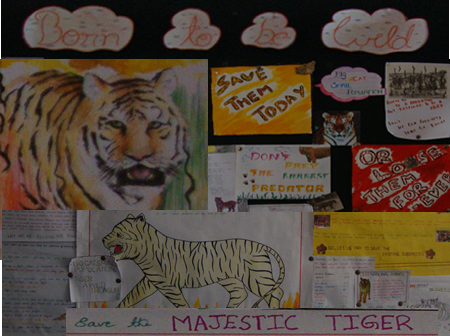Leonardo DiCaprio Kicks Off IFAW’s Animal Action Week

The notice board at Ashram Public School, Kakinada, Andhra Pradesh displaying the spirit of Animal Action Week
Yarmouth Port (USA), October 1, 2012: Actor and activist Leonardo DiCaprio joined IFAW (International Fund for Animal Welfare – www.ifaw.org) today in calling for the world community to step up efforts to save elephants from poaching and the illegal ivory trade, which have escalated dramatically in recent years.
“In 2011 an unprecedented 24.3 tons of ivory was seized by government authorities worldwide, the largest amount recorded since the 1989 ivory ban. Tragically this trend is continuing in 2012,” said
DiCaprio, an IFAW Honorary Board member. “Widespread poaching is being recorded throughout Africa, even in areas in southern Africa that were previously considered safe for elephants.”
DiCaprio serves as global ambassador for IFAW’s Animal Action program – an international public awareness and education initiative that reaches more than five million young people and their families in more than 18 countries worldwide each year. Now in its 20th year, the campaign empowers young people around the globe to speak and act on behalf of animals.
“We are thrilled to join forces again with Leonardo in our mission to help elephants live safely in the wild,” said IFAW Executive Vice President Azzedine Downes. “His commitment to advocating for the wellbeing of elephants is vital in our efforts to educate and inspire the next generation of conservation leaders.”
Last year, IFAW’s Animal Action program mobilized more than 50,000 students to sign pledges, create art, and write letters to help advance IFAW’s work protecting elephants from poaching, habitat loss and other threats.
While the 1989 ivory ban caused a decline in the number of elephants killed by poachers, recent years have seen a surge in mass killings of the world’s largest land animals. In the past year alone, an estimated 3,000 elephants were slaughtered for their ivory.
Supported by international criminal syndicates, the ivory is most often smuggled from Africa to China, and sold for huge profits which can fund regional conflicts before being carved into highly sought after trinkets and jewelry.
“Elephants are in crisis once again. We must come together to reduce demand for ivory in China and other countries, and to protect elephants where they live,” added DiCaprio. “We cannot continue decimating elephants and other species for products nobody needs.”
To date, more than 280,000 adults have joined IFAW’s Elephant March social media campaign (www.elephantmarch.com) to promote a groundswell of public support for ending all trade in ivory.